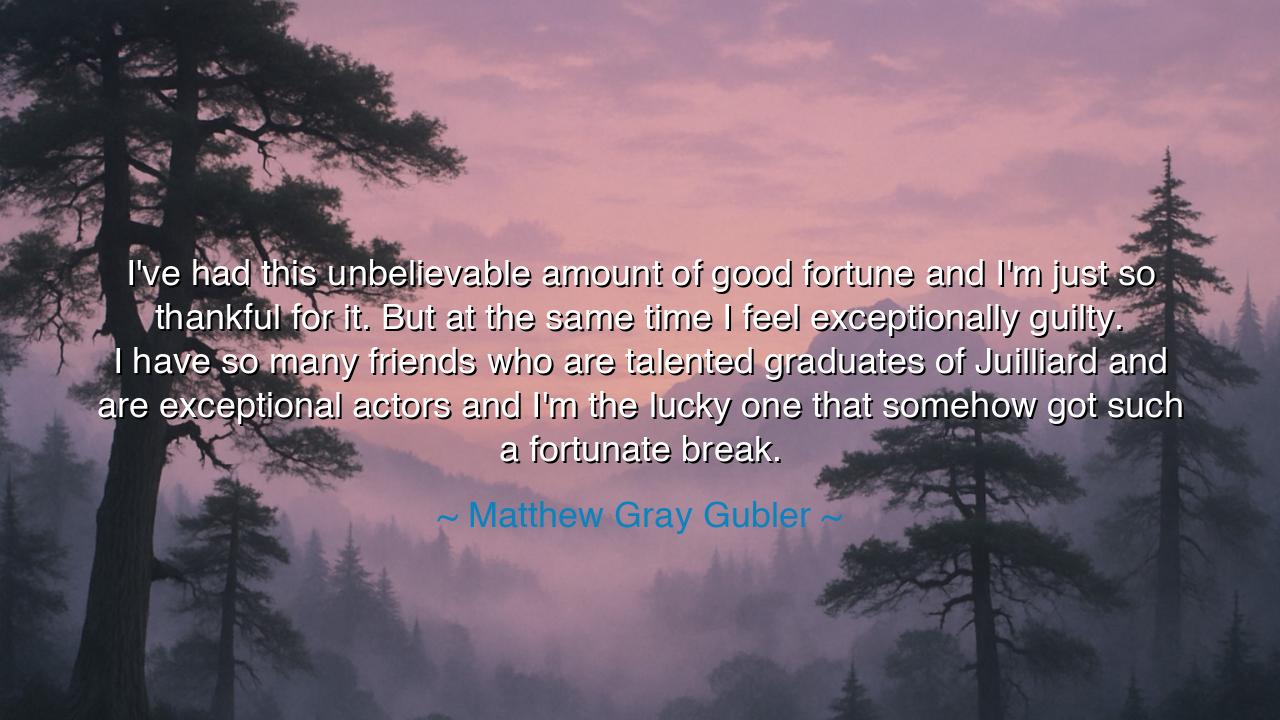
I've had this unbelievable amount of good fortune and I'm just
I've had this unbelievable amount of good fortune and I'm just so thankful for it. But at the same time I feel exceptionally guilty. I have so many friends who are talented graduates of Juilliard and are exceptional actors and I'm the lucky one that somehow got such a fortunate break.






When Matthew Gray Gubler confesses, “I’ve had this unbelievable amount of good fortune and I’m just so thankful for it. But at the same time I feel exceptionally guilty. I have so many friends who are talented graduates of Juilliard and are exceptional actors and I’m the lucky one that somehow got such a fortunate break,” he speaks with a heart both humbled and burdened. In these words we hear the paradox of destiny: that success, while sweet, can awaken a sense of sorrow for those equally deserving who remain in the shadows. His testimony is not of pride, but of thankfulness mixed with guilt, a recognition that talent alone is never the only path to recognition—fortune and timing play their part.
The origin of his reflection lies in the merciless uncertainty of the performing arts, where countless gifted men and women labor without ever being seen. To train at a place such as Juilliard is to enter the company of the best, and yet even among the best, the spotlight shines only on a few. Gubler acknowledges that he stands in that light not solely because of his craft, but also because of opportunity, chance, and what he calls “a fortunate break.” His gratitude is honest, but it is shaded with the awareness of injustice—that the world does not always reward talent in equal measure.
This struggle of fortune against merit is as old as history itself. Consider the tale of Diogenes, the philosopher who lived in poverty though he possessed a brilliant mind, while others of lesser depth enjoyed patronage and fame. Or think of the soldier at Marathon, who fought with the same courage as the generals but whose name was never recorded. The ancients knew well that fate does not distribute glory fairly. Gubler’s words, then, echo this eternal truth: that life grants the crown to some, while others equally worthy remain unnamed.
Yet in his guilt lies also his humility. Many who are blessed with fortune cloak themselves in pride, claiming their success as proof of superiority. But Gubler instead looks to his peers and confesses, “They are exceptional, and I am lucky.” This is the voice of wisdom, for it recognizes that luck and labor are intertwined, and that to receive more than one deserves should awaken not arrogance, but a deeper sense of responsibility. His thankfulness becomes not merely gratitude for what he has, but respect for those who remain unseen.
This reflection carries another truth: that guilt, when properly embraced, can be transformed into compassion. Gubler’s awareness of his fortune may weigh on him, but it also has the power to inspire him to use his platform to honor others. The ancients would call this noblesse oblige—the duty of the fortunate to uplift those less fortunate. By acknowledging the gifts of his peers, he plants a seed of justice, ensuring that his success is not only for himself, but for the community of artists whose brilliance may yet shine through him.
The lesson for us is clear: when we achieve success, let us walk in thankfulness and humility, not in pride. Let us remember that for every one who is seen, there are many who labor unseen, no less talented, no less worthy. Let gratitude be mingled with compassion, so that we do not hold our blessings selfishly, but extend them outward in generosity, mentorship, and advocacy for others.
Practical wisdom follows. In your own life, when fortune smiles upon you, resist the temptation to believe you earned it alone. Acknowledge the role of timing, circumstance, and even chance. Be thankful, but also be mindful of those who walk the same path without recognition. Use your platform, however small or great, to celebrate others, to give them space, to amplify their voices. In this way, success becomes not only personal triumph, but communal blessing.
Thus, in the words of Matthew Gray Gubler, we are reminded that success is never ours alone. It is a gift, shaped by labor, yes, but also by the unseen hand of fortune. To feel both thankful and guilty is to be human, but to turn that guilt into gratitude and service is to be wise. Let us, then, embrace our blessings with humility, honor those who remain unseen, and carry our good fortune as a responsibility to uplift the world.






AAdministratorAdministrator
Welcome, honored guests. Please leave a comment, we will respond soon